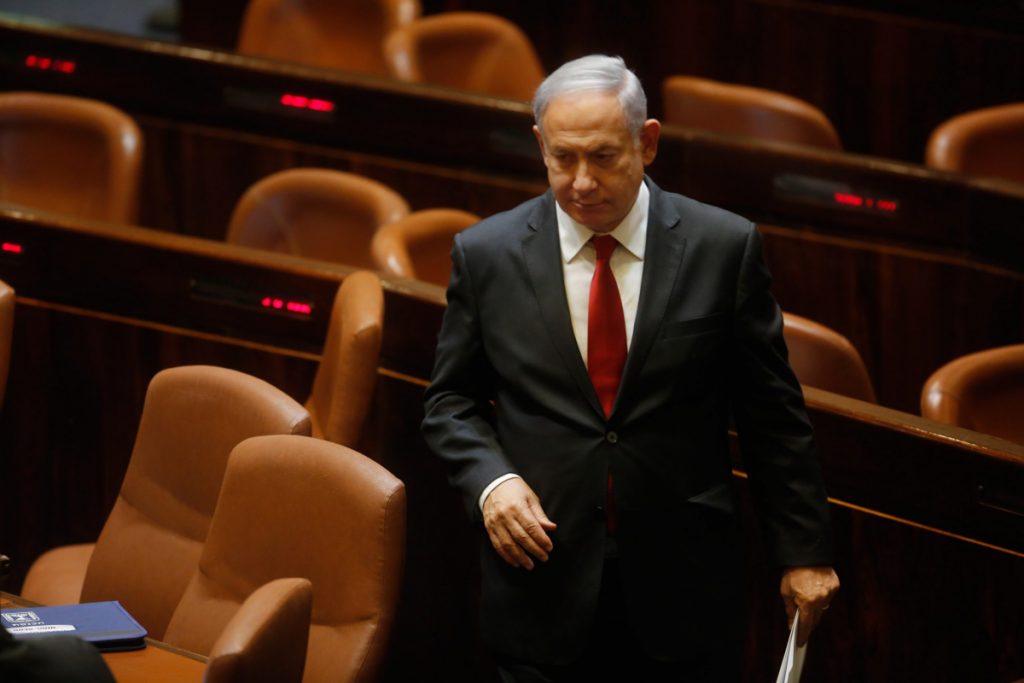Australia/Israel Review
Netanyahu’s last shot?
Jun 30, 2022 | Dov Lieber, Yardena Schwartz

The imminent collapse of Israel’s shaky ruling coalition gives Binyamin Netanyahu his fifth chance in three years to form a stable government. It could be his last shot, political observers said.
Netanyahu, 73 years old, is in a strong position as Israel’s politics continue a rightward shift and his allied parties grow, analysts said. After a year as Opposition Leader, Israelis have seen what a government looks like without Netanyahu at the top for the first time in over a decade, and polls show many didn’t like what they saw.
Even Netanyahu’s ongoing trial on corruption charges appears to be going better, as prosecutors struggle to prove the most serious allegation against him, bribery, which he denies. Judges in the case recently denied prosecutors’ request to amend the indictment on the charge.
Polls show that Netanyahu is still Israel’s most popular politician, though he remains divisive. In almost every poll, he and his allied parties fall short of a majority of seats in Israel’s 120-member parliament, known as the Knesset.
“Compared to previous elections, Bibi is in a better starting point now,” said Aviv Bushinsky, a former adviser to Netanyahu, using a common nickname for the former prime minister. “If he fails this time to reach a majority, his allies may no longer side with him.”
Uri Maklev, a lawmaker from the ultraorthodox United Torah Judaism party, a Netanyahu ally, underscored that point, telling Israel’s Army Radio that his party could consider Israeli Defence Minister Benny Gantz as prime minister if Netanyahu fails to get a majority.
“I think that Netanyahu won’t be able to form a government,” he said in an interview with Army Radio on Tuesday morning. “We have never, not for a moment, ruled out Benny Gantz. I think that we will strive for that.”
The outgoing Government is unique in Israeli political history, with centre, right and left factions teaming up with an Arab Islamist party in an anti-Netanyahu coalition that removed the former prime minister from power last year for the first time since 2009.
As Opposition Leader, Netanyahu cast the Government as beholden to Islamists and other Arab parties, at times calling it a “Muslim Brotherhood government.” The Government’s leaders say the coalition was inclusive of all parts of Israeli society, including Arab citizens who make up around 20% of the population.
In a theme expected to play out over the election, Netanyahu on Monday night attacked Gideon Saar, a lawmaker in the anti-Netanyahu coalition who was once the former prime minister’s ally. Saar has vowed to do all he can to prevent Netanyahu from returning to power.
“He cancels me out but sits with the Muslim Brotherhood that supports terror,” Netanyahu said of Saar.
In turn, Saar and other opponents of Netanyahu are attacking him for allying with the party of far-right religious politician Itamar Ben-Gvir. Ben Gvir’s hard-line views against Arabs, including expelling those he would consider not loyal to the state and supporting the use of maximum military force against Palestinians, have helped him quickly become one of Israel’s most popular right-wing politicians.
On June 21, Saar told Israel’s Ynet News that “the government of Bibi and Ben-Gvir will bring a certain end to the rule of law and be captive to extremism of any kind.”
Netanyahu was the first Israeli leader to negotiate with the Islamist party to help establish a government, but his more hard-line allies refused to rely on an Arab party.
In the past four elections, Netanyahu ran as the prime minister. This time, the prime minister will be Yair Lapid, the centrist news anchor turned politician who serves as foreign minister in the outgoing Government. Prime Minister Naftali Bennett held to an agreement forged a year ago to let Lapid take power if the Government fell.
Lapid is the clear top challenger to Netanyahu. Once vulnerable to Netanyahu’s attacks for being unqualified and inexperienced when he entered politics, Lapid now has nearly a decade of political experience.
But Lapid has no clear path to a majority coalition either. Polls show Netanyahu’s Likud party would win between 34 and 36 seats in the Knesset, while Lapid’s Yesh Atid party gets about 20 seats.
Ultimately, analysts say, the election will become another referendum on Netanyahu. He first rose to power in 1996, serving three years as prime minister, and then staged a political comeback in 2009. He has served longer in office as prime minister than any other Israeli politician.
But over that time, Netanyahu has burned personal relationships with the heads of most centrist, left-wing or right-wing parties now opposed to him. His critics from across the political spectrum say the former prime minister had used his position for personal interests and that he seeks power to either evade or defend the criminal allegations against him.
Netanyahu says he wants to return to power to improve the economy, secure the country and continue to expand Israel’s widening circle of allies in the region. He has said the abuse-of-power allegations are untrue and the investigations politically motivated.
“People admire him. They call him the magician,” said Prof. Gideon Rahat, a senior fellow at the Israel Democracy Institute, a Jerusalem think tank funded by educational institutions, family foundations and corporations. “He isn’t a magician when it comes to establishing a government and building coalitions.”
Dov Lieber is a Wall Street Journal correspondent covering Israel and the Palestinian Territories. Yardena Schwartz is an award-winning freelance journalist and Emmy-nominated producer based in Tel Aviv. © Wall Street Journal (www.wsj.com), reprinted by permission, all rights reserved.
Tags: Binyamin Netanyahu, Israel






